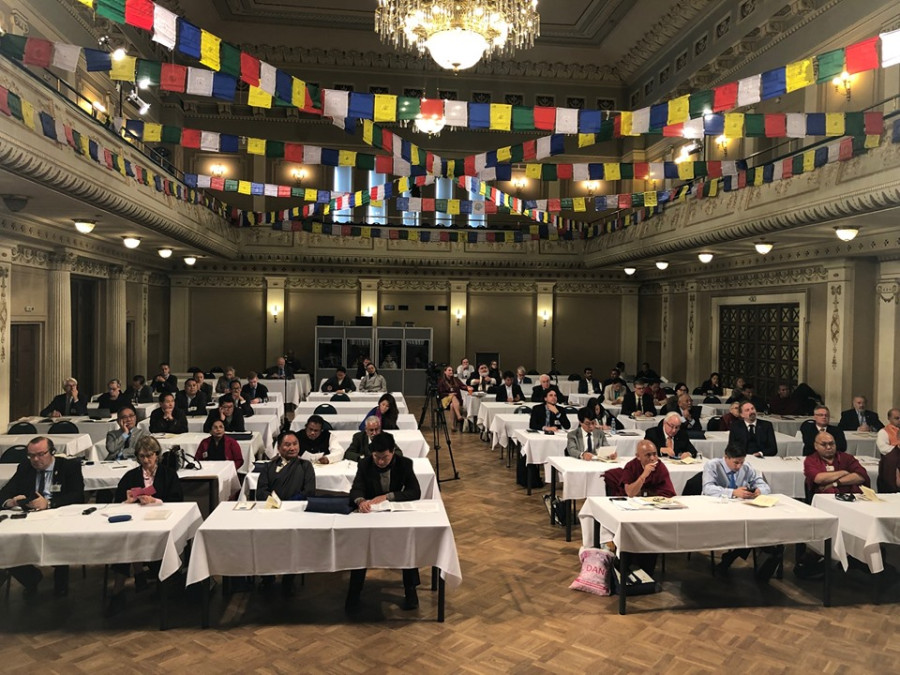National
Government officials say they were unaware of Nepali lawmakers' visit to Europe to attend Tibet convention
Officials say the trip to the World Parliamentarians Convention on Tibet, held in Latvia, is against Nepal’s official One-China policy.
Anil Giri
Nepal’s official One-China policy has come under serious scrutiny after two Members of Parliament recently participated in an event organised by the Latvian Parliamentary Support Group for Tibet and the International Network of Parliamentarians on Tibet while on a personal trip to the European country.
This comes just as three government journalists are under investigation by the state news agency for disseminating a report about the Tibetan spiritual leader Dalai Lama, in what the communication minister described as a violation of the official One-China policy.
Pradip Yadav of the Samajbadi Party, Nepal, which was formed after the merger of the Sanghiya Samajbadi Forum-Nepal and the Naya Shakti Party Nepal, and Iqabal Miya of the Rastriya Janata Party-Nepal participated in the convention in Riga, the Latvian capital, last week. The event was attended by Lobsang Sangay, president of the Central Tibetan Administration, Speaker Pema Jungney and Deputy Speaker Ven Acharya Yeshi Phuntsok of the Tibetan Parliament-in-Exile, along with other members of parliament.
In a phone interview with the Post, Miya initially said that he had travelled to Switzerland, but eventually conceded—when presented with a report published on the website of the Central Tibetan Administration that testified to the presence of the Nepali parliamentarians—that he had visited Latvia specifically to attend the conference in support of the Tibetan parliamentarians and the Tibetan people.
“Others were also there, including friends from India. We did not have any idea about the conference so we did not speak anything,” Miya said. Both Miya and Yadav had not taken consent from the Parliament Secretariat to attend the function.
“The two leaders said they were visiting Latvia for personal reasons and they did not disclose the details and purpose of their visit,” a joint-secretary at the Parliament Secretariat told the Post on condition of anonymity because he was not authorised to speak with the media.

If a parliamentarian has to visit a foreign country, he or she needs to receive consent from the Speaker of the House of Representatives or the chairman of the National Assembly, detailing destination and purpose of the visit.
“They just sought a letter from the Parliament Secretariat confirming that they were lawmakers,” the joint-secretary told the Post.
The lawmakers also did not visit the Department of Consular Services to seek visa recommendation for Latvia since the visit was personal in nature.
The Post, despite multiple attempts, could not reach Yadav for comments.
This is not the first time that Nepali leaders and parliamentarians have breached Nepal government’s commitment to the One-China policy, which states that Tibet and Taiwan are integral parts of China.
In 2010, three members of the Constituent Assembly visited Dharmasala in India and met the Dalai Lama, in an event that drew widespread criticism. A year later, a serious controversy erupted when Nepali Congress President and former prime minister Sher Bahadur Deuba attended an event organised by the India Foundation, a think tank, and shared the dais with Lobsang Sangay, president of the Central Tibetan Administration.
In Latvia, the declaration of the convention stated that the Central Tibetan Administration is thankful for the participation of those Members of Parliament who came to Riga despite having been pressured by the Government of the People’s Republic of China not to attend the forum.
The convention also expressed solidarity with the Tibetan people in their non-violent struggle for their rights including their right to self-determination.
According to the Central Tibetan Administration's website, the convention was attended by over 100 international participants, including 25 lawmakers from Australia, New Zealand, France, Romania, Canada, Czech Republic, Lithuania, India, Nepal, Chile, Latvia, the United Kingdom, and Scotland.
At home, foreign affairs experts said the participation of parliamentarians, including one from a party which is part of the incumbent government, showcases flaws in state functioning and the weak conduct of Nepal’s foreign policy.
Former foreign minister Ramesh Nath Pandey said the trip is diplomatically an embarrassment for the country. “If they attended the convention, it’s a matter of embarrassment,” Pandey told the Post. “It shows our system does not prevail and if we don’t become serious on foreign policy issues, it will damage the country’s reputation.”
When asked about the participation of Yadav and Miya’s in the convention, Rastriya Janata Party-Nepal leader Rajendra Mahato said he was not aware of any visit by the parliamentarians to Latvia. “Probably they were there for a parliamentary delegation which I am not aware of,” Mahato told the Post.
Foreign Ministry Spokesperson Bharat Raj Poudyal said that his ministry was not aware of the parliamentarians’ visit to Latvia. “If a parliamentarian participated in the conference,” he said, “it is against the policy of the government of Nepal.”




 9.83°C Kathmandu
9.83°C Kathmandu














